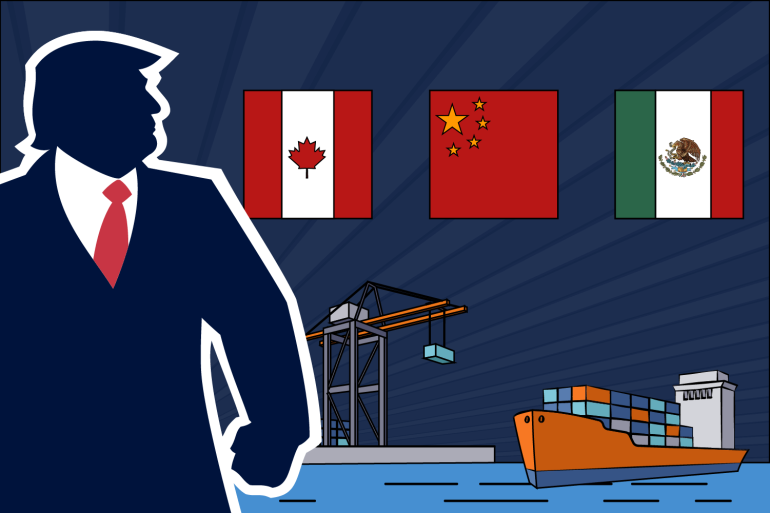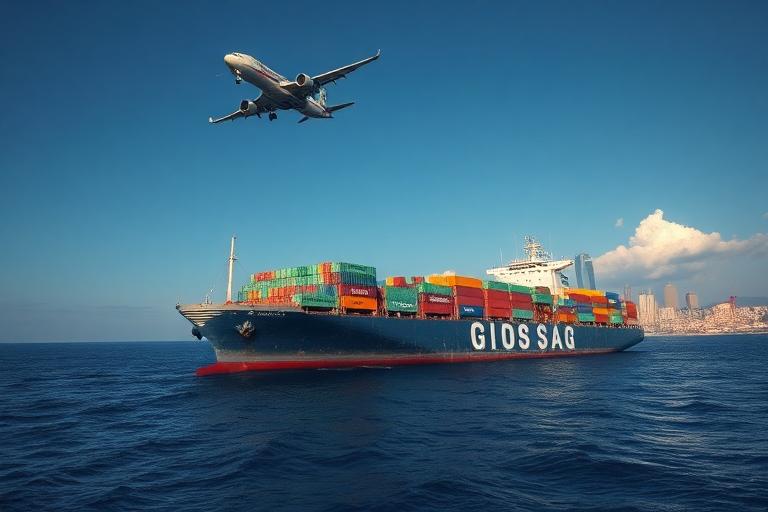Are you looking to simplify your shipping needs from China to Niger?
Understanding the pivotal role of a shipping agent can make all the difference in ensuring a smooth import process. In this comprehensive guide, we will explore the essential services offered by shipping agents, key considerations for choosing the right one, and the best practices to enhance your shipping experience. Whether you’re a first-time importer or a seasoned business owner, this article will equip you with the insights needed to navigate the complexities of international shipping to Niger.

Understanding the Role of a Shipping Agent from China to Niger
What Services Do Shipping Agents Offer for Importing to Niger?
When importing goods from China to Niger, utilizing the expertise of a shipping agent can significantly enhance the efficiency and success of your logistics operations. Shipping agents serve as intermediaries between the importer and various transport services, ensuring a seamless flow of goods. Here are the primary services offered:
Customs Clearance: Navigating the complexities of Nigerien customs regulations requires specialized knowledge. Shipping agents assist in preparing and submitting the necessary documentation to facilitate smooth clearance, ensuring compliance with Customs Clearance.
Freight Forwarding: Whether you choose ocean, air, or rail freight, shipping agents manage the logistics of transporting your goods, optimizing routes and costs to meet your delivery timelines.
Insurance Coverage: Protecting your goods during transit is vital. Shipping agents offer insurance options to safeguard against potential losses or damages.
Door-to-Door Services: Many agents provide convenient door-to-door shipping solutions, handling the logistics from the origin in China to the final destination in Niger.
Consolidation Services: For smaller shipments, agents can consolidate multiple orders into one shipment, reducing costs and improving efficiency. Learn more about consolidated freight.
Warehousing Solutions: Temporary storage solutions may be offered, allowing for flexibility in receiving and distributing goods.
By leveraging these services, importers can focus more on their core business operations while ensuring that their logistics needs are met effectively.
The Benefits of Using a Local Shipping Agent in Niger
Engaging a local shipping agent in Niger can provide several advantages for businesses importing goods from China. Here are some key benefits:
In-depth Knowledge of Local Regulations: Local agents have a comprehensive understanding of Nigerien import laws and customs regulations. Their expertise helps to facilitate compliance, reducing the risk of delays and penalties.
Established Networks: A local shipping agent often has established relationships with local authorities, ports, and carriers, which can expedite processes and improve communication.
Cultural and Language Proficiency: Navigating foreign logistics can be challenging due to cultural differences and language barriers. Local agents can bridge these gaps, ensuring smoother interactions.
Faster Problem Resolution: In the event of issues such as customs delays or logistical challenges, a local agent can take swift action to resolve them, minimizing disruptions to your supply chain.
Cost Savings: Utilizing a local agent can lead to cost efficiencies through their knowledge of the best shipping routes, carriers, and services, ultimately reducing your overall shipping expenses.
By choosing a local shipping agent in Niger, you can ensure a more streamlined and cost-effective import process.
Key Considerations When Choosing a Shipping Agent from China to Niger
Assessing the Agent’s Knowledge of Nigerien Import Regulations
When selecting a shipping agent, it is vital to evaluate their understanding of Nigerien import regulations. An agent with comprehensive knowledge will ensure compliance with all local laws, which reduces the likelihood of delays or additional costs due to regulatory issues. You may inquire about their previous experiences with shipments to Niger and request case studies or testimonials from other clients.
Transparency in Pricing: Avoiding Hidden Fees and Charges
Understanding the pricing structure of your shipping agent is crucial. A reputable agent will provide a clear breakdown of all costs involved in the shipping process, including freight charges, customs duties, and any additional fees. To avoid unexpected expenses, always ask for a detailed quote and clarify any terms that may seem ambiguous. Transparency is key to establishing trust and avoiding disputes later on.
Evaluating the Agent’s Network and Partnerships with Freight Carriers
The effectiveness of a shipping agent is often reflected in their network and partnerships. Evaluate the agent’s connections with various freight carriers, including both ocean freight and air freight options. A well-connected agent can leverage their relationships to secure better rates and more reliable service, which can directly benefit your shipping experience. Inquire about their partnerships and how they can facilitate timely deliveries based on your specific needs.
In conclusion, selecting the right shipping agent is critical for successful importing from China to Niger. By understanding their role and the services they provide, as well as considering key factors like knowledge of local regulations, pricing transparency, and network strength, you can make informed decisions that will positively impact your logistics operations. At Dantful International Logistics, we pride ourselves on being a highly professional, cost-effective, and high-quality provider of international logistics services, ready to support your importing needs from China to Niger.
Popular Shipping Methods from China to Niger
Sea Freight from China to Niger: Advantages and Disadvantages
Sea freight is one of the most commonly used methods for shipping goods from China to Niger. Understanding its advantages and disadvantages is crucial for importers.
Advantages:
- Cost-Effectiveness: Sea freight is generally more affordable than air freight, especially for larger shipments. It is a preferred option for bulky items or shipments that do not require expedited delivery.
- Higher Capacity: Ships can carry a significantly larger volume of cargo compared to planes, making it ideal for bulk imports.
- Environmental Impact: Sea transport tends to have a lower carbon footprint per ton-mile compared to air freight, contributing to more sustainable shipping practices.
Disadvantages:
- Longer Transit Time: Shipping by sea typically takes longer, with transit times ranging from 25 to 40 days depending on the exact port of departure and arrival.
- Port Accessibility: Niger is a landlocked country, which means that goods must be transported to the nearest port, such as Cotonou in Benin or Lomé in Togo, adding additional logistics and time.
- Weather Dependency: Sea freight can be affected by weather conditions, which may lead to delays.
A comparison of estimated shipping times and costs for sea freight from major ports in China to ports accessible for Nigerien imports can be summarized in the table below:
| Departure Port | Arrival Port | Estimated Transit Time | Average Cost (USD/20ft) |
|---|---|---|---|
| Shanghai | Cotonou | 30-35 days | $1,200 – $1,500 |
| Shenzhen | Lomé | 28-33 days | $1,100 – $1,400 |
| Ningbo | Cotonou | 32-40 days | $1,250 – $1,600 |
Air Freight from China to Niger: Speed vs. Cost Analysis
Air freight is the fastest option for shipping goods from China to Niger. While it comes with its advantages, weighing these against the costs is essential for importers.
Advantages:
- Speed: Air freight offers significantly shorter transit times, typically ranging from 5 to 10 days. This is particularly beneficial for time-sensitive shipments.
- Reliability: Flights are less affected by seasonal changes and weather conditions compared to sea transport, leading to fewer delays.
- Lower Risk of Damage: Air transport reduces the handling of cargo, thus minimizing the risk of damage compared to sea freight.
Disadvantages:
- Higher Costs: Air freight is generally much more expensive than sea freight, making it less viable for bulk shipments. Costs can escalate quickly depending on weight and dimensions.
- Limited Capacity: Aircraft have stricter limitations on cargo size and weight, which may restrict large imports.
The following table highlights the cost and transit time for air freight from key Chinese cities to Niger:
| Departure City | Estimated Transit Time | Average Cost (USD/500kg) |
|---|---|---|
| Shanghai | 6-8 days | $600 – $800 |
| Shenzhen | 5-7 days | $550 – $750 |
| Beijing | 7-10 days | $700 – $900 |
Comparing Delivery Times and Reliability Between Sea and Air Shipping
When choosing between sea and air shipping, it is important to consider both delivery times and reliability.
| Shipping Method | Average Transit Time | Cost Comparison | Reliability |
|---|---|---|---|
| Sea Freight | 25-40 days | Lower | Moderate |
| Air Freight | 5-10 days | Higher | High |
In summary, while sea freight is more cost-effective for large shipments, air freight ensures speed and reliability for urgent deliveries. Depending on the nature of the goods and the urgency of the shipment, importers can make an informed choice.
READ MORE:
- Shipping From China To Algeria
- Shipping From China To Angola
- Shipping From China To Morocco
- Shipping From China To Nigeria
- Shipping From China To Kenya
- Shipping From China To Tanzania
- Shipping From China To South Africa
Best Practices for Working with Your Shipping Agent
Establishing Effective Communication Channels
Effective communication is paramount when working with a shipping agent. Establishing clear channels of communication ensures that all parties are aligned on shipment details, timelines, and any potential issues that may arise. Consider using multiple communication methods, such as email, phone calls, and instant messaging applications, to enhance responsiveness and clarity.
Preparing and Providing Complete Shipping Documentation
Accurate and complete shipping documentation is crucial for smooth customs clearance and delivery. This includes the Bill of Lading, Commercial Invoice, Packing List, and any necessary import permits. Ensuring that your shipping agent has all required documents beforehand can prevent delays and reduce the risk of additional charges.
Collaborating on Logistics: Building a Strong Working Relationship
Building a strong working relationship with your shipping agent can lead to better service and more favorable rates. Regular check-ins, mutual feedback, and understanding each other’s processes can foster collaboration. A reliable shipping agent like Dantful International Logistics can offer a comprehensive range of services, including Ocean Freight, Air Freight, Customs Clearance, and more, ensuring your shipments from China to Niger are handled with expertise and care.
Common Challenges When Shipping from China to Niger
Understanding and Navigating Nigerien Customs and Import Duties
When importing goods from China to Niger, one of the most significant challenges is navigating the complex landscape of Nigerien customs regulations and import duties. The customs procedures in Niger can be intricate, and failure to comply with regulations can result in delays, fines, or even the confiscation of goods. Import duties can vary significantly based on the type of goods, and they are typically calculated as a percentage of the customs value, which includes the cost of the goods, shipping, and insurance.
To effectively understand and navigate these duties, it is crucial for importers to familiarize themselves with the Nigerien Customs Code. This code outlines the classification of goods, the applicable tariffs, and essential documentation requirements. Partnering with a knowledgeable shipping agent, such as Dantful International Logistics, can provide valuable guidance in this area, as they are well-versed in local regulations and can facilitate compliance, ensuring a smoother import process.
Strategies for Managing Transit Delays and Unexpected Costs
Transit delays can be a common issue when shipping from China to Niger. Factors such as adverse weather conditions, port congestion, or logistical challenges can lead to delays that may disrupt supply chains. Additionally, unexpected costs may arise from customs inspections, additional handling fees, or changes in shipping routes.
To manage these challenges effectively, importers can adopt the following strategies:
Plan for Contingencies: Allow for extra time in shipping schedules and consider potential delays in your overall logistics planning. This buffer can help mitigate the impact of unexpected transit times.
Communicate Proactively with Your Shipping Agent: Keep an open line of communication with your shipping agent. They can provide real-time updates on shipment status and alert you to any potential delays or issues.
Budget for Unexpected Costs: In addition to regular shipping expenses, set aside a contingency fund to cover unforeseen costs. Being financially prepared can alleviate stress and help maintain cash flow.
By implementing these strategies, importers can not only reduce the impact of transit delays but also remain agile in addressing unexpected costs.
Risk Management: Preparing for Potential Shipping Issues
Shipping from China to Niger can bring several risks, including damage to goods, loss of shipments, or delays due to unforeseen events. Effective risk management is essential for minimizing these potential issues. Here are key steps importers can take:
Insurance Coverage: Consider purchasing comprehensive shipping insurance. This coverage can protect against loss or damage during transit, offering peace of mind and financial protection.
Use Reliable Freight Partners: Work with reputable freight carriers that have a proven track record of reliability. Ensure that your shipping agent conducts thorough due diligence when selecting partners.
Implement Quality Control Measures: Inspect goods upon arrival and document any discrepancies immediately. Having robust quality control processes can help you identify issues early and address them swiftly.
By proactively identifying risks and implementing effective management strategies, importers can safeguard their shipments and ensure a more reliable shipping experience.
Tips for First-Time Importers from China to Niger
Essential Steps for Successful Importing
For those new to importing from China to Niger, understanding the essential steps in the process is crucial for success. Here are some key actions to consider:
Research Your Market: Understand the demand for your products in Niger. This includes identifying target customers and competitors to ensure your offerings are well-positioned.
Select the Right Suppliers: Utilize platforms such as Alibaba or Global Sources to find reliable suppliers. Conduct thorough evaluations, including requesting samples and checking reviews.
Familiarize Yourself with Import Regulations: Work closely with a shipping agent to ensure compliance with Nigerien customs regulations and import duties. Proper documentation, such as invoices and packing lists, is critical for smooth customs clearance.
Choose a Suitable Shipping Method: Depending on your timeline and budget, decide between sea freight and air freight. Sea freight is generally more cost-effective for larger shipments, while air freight offers speed for urgent deliveries.
Plan for Logistics and Distribution: Consider how you will handle warehousing and distribution once your goods arrive in Niger. Efficient logistics planning is essential for maintaining customer satisfaction.
Resources and Tools for Researching Suppliers in China
Finding the right suppliers is a cornerstone of successful importing. Here are some valuable resources and tools for first-time importers looking to research suppliers in China:
Online Marketplaces: Websites like Alibaba, Made-in-China, and Global Sources offer a vast array of suppliers and products. Use these platforms to request quotes and evaluate supplier credibility.
Trade Shows: Attending trade shows in China, such as the Canton Fair, allows importers to meet suppliers face-to-face, inspect products, and negotiate deals directly.
Industry Associations: Joining industry associations related to your product category can provide access to a network of trusted suppliers and industry insights.
Supplier Verification Services: Consider using third-party verification services, such as SGS or Bureau Veritas, which can conduct on-site inspections and audits of potential suppliers to ensure their legitimacy and reliability.
Leveraging these resources can significantly enhance the likelihood of establishing successful and trustworthy partnerships with suppliers in China. By following these essential steps and utilizing available tools, first-time importers can navigate the complexities of international trade with greater confidence.

Young Chiu is a seasoned logistics expert with over 15 years of experience in international freight forwarding and supply chain management. As CEO of Dantful International Logistics, Young is dedicated to providing valuable insights and practical advice to businesses navigating the complexities of global shipping.





















 Afrikaans
Afrikaans Shqip
Shqip አማርኛ
አማርኛ العربية
العربية Հայերեն
Հայերեն Azərbaycan dili
Azərbaycan dili Euskara
Euskara Беларуская мова
Беларуская мова বাংলা
বাংলা Bosanski
Bosanski Български
Български Català
Català Cebuano
Cebuano Chichewa
Chichewa 简体中文
简体中文 繁體中文
繁體中文 Corsu
Corsu Hrvatski
Hrvatski Čeština
Čeština Dansk
Dansk Nederlands
Nederlands English
English Esperanto
Esperanto Eesti
Eesti Filipino
Filipino Suomi
Suomi Français
Français Galego
Galego ქართული
ქართული Deutsch
Deutsch Ελληνικά
Ελληνικά Kreyol ayisyen
Kreyol ayisyen Harshen Hausa
Harshen Hausa Ōlelo Hawaiʻi
Ōlelo Hawaiʻi עִבְרִית
עִבְרִית हिन्दी
हिन्दी Hmong
Hmong Magyar
Magyar Íslenska
Íslenska Igbo
Igbo Bahasa Indonesia
Bahasa Indonesia Gaeilge
Gaeilge Italiano
Italiano 日本語
日本語 Basa Jawa
Basa Jawa ಕನ್ನಡ
ಕನ್ನಡ Қазақ тілі
Қазақ тілі ភាសាខ្មែរ
ភាសាខ្មែរ 한국어
한국어 كوردی
كوردی Кыргызча
Кыргызча ພາສາລາວ
ພາສາລາວ Latin
Latin Latviešu valoda
Latviešu valoda Lietuvių kalba
Lietuvių kalba Lëtzebuergesch
Lëtzebuergesch Македонски јазик
Македонски јазик Malagasy
Malagasy Bahasa Melayu
Bahasa Melayu മലയാളം
മലയാളം Maltese
Maltese Te Reo Māori
Te Reo Māori मराठी
मराठी Монгол
Монгол ဗမာစာ
ဗမာစာ नेपाली
नेपाली Norsk bokmål
Norsk bokmål پښتو
پښتو فارسی
فارسی Polski
Polski Português
Português ਪੰਜਾਬੀ
ਪੰਜਾਬੀ Română
Română Русский
Русский Samoan
Samoan Gàidhlig
Gàidhlig Српски језик
Српски језик Sesotho
Sesotho Shona
Shona سنڌي
سنڌي සිංහල
සිංහල Slovenčina
Slovenčina Slovenščina
Slovenščina Afsoomaali
Afsoomaali Español
Español Basa Sunda
Basa Sunda Kiswahili
Kiswahili Svenska
Svenska Тоҷикӣ
Тоҷикӣ தமிழ்
தமிழ் తెలుగు
తెలుగు ไทย
ไทย Türkçe
Türkçe Українська
Українська اردو
اردو O‘zbekcha
O‘zbekcha Tiếng Việt
Tiếng Việt Cymraeg
Cymraeg יידיש
יידיש Yorùbá
Yorùbá Zulu
Zulu